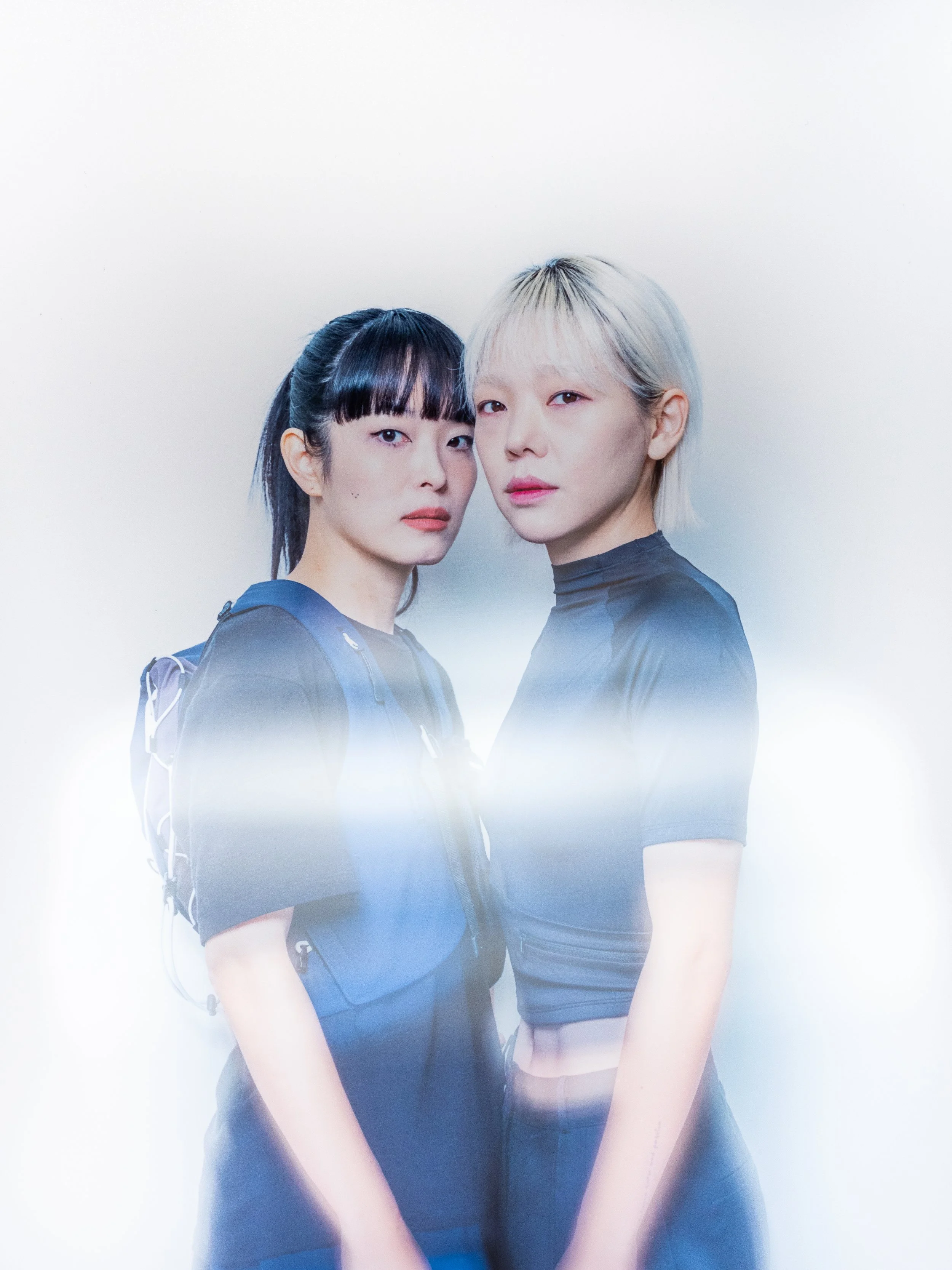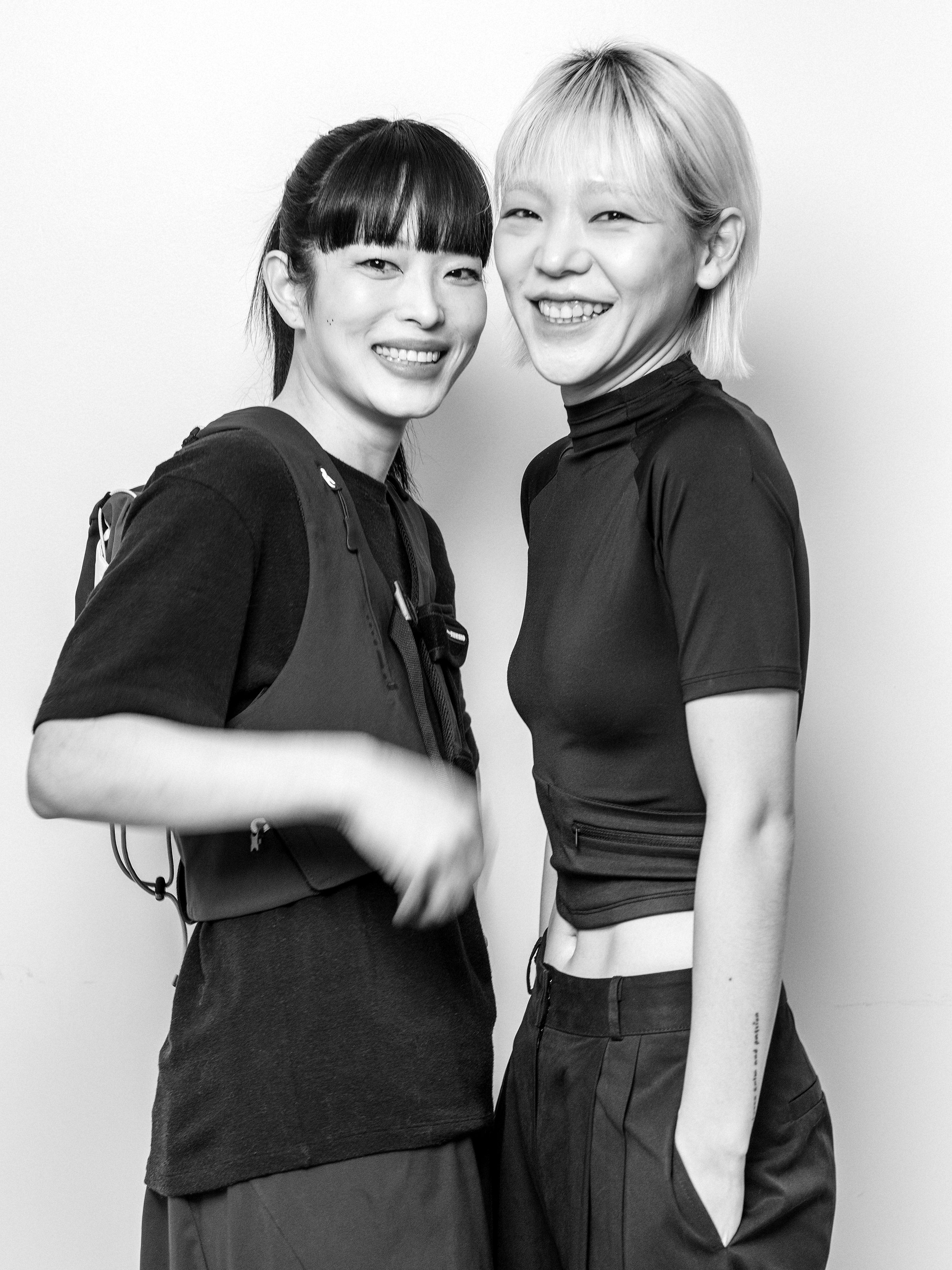Rethinking tradition with HAEPAARY
Written by Ella Kaill (@ellakaill) and Harry Heo (@heo.harrry)
Photography by Blair Kitchener (@blairkitchener)
Minhee and Hyewon are HAEPAARY, the critically-acclaimed duo marrying slick electronic beats with intricate Confucian melodies. They won Best Electronic Song at this year's Korean Music Awards with go to gdp and then. They spent the rest of the year playing shows and festivals all over Korea and around the world, including DMZ Peace Train, SXSW, and Platform Magazine's Busan Weekender in July.
HAEPAARY's music rejects easy categorisation, something the duo have been pressed on many times during their career. "We usually describe our sound as 'alt-electronic' because that's what it is. But it's also a lot of other elements," they tell us. HAEPAARY combine raw, trance-like beats with elements from Royal Ancestral Ceremony music (Jongmyo Jeryeak) passed down from the Joseon period (1392–1910). The style was originally performed at Jongmyo Shrine during the royal worship rituals of late kings and queens. But HAEPAARY doesn't want to be slapped with the 'traditional music' label. "We want the music we make to be perceived as both sensuous and intuitive, but listeners don't always hear it the way we intended it," Minhee explains. "We both learned traditional Korean music growing up, so when we make music now, we're pulling from a huge sound library in our heads that also happens to include traditional music."
The duo considers traditional music as just one of the many tools they use to construct their sound, rather than a basis for it. "It comes out naturally. We're not putting those sounds in to be cool. We studied traditional music for a really long time, so it's a part of us," says Hyewon. The first instruments they ever held were traditional Korean instruments. For HAEPAARY, it's not about gimmicks; it's about being true to their experiences. Hyewon says, "I learned piano and violin like everyone else when I was young, but I started with a percussion instrument. I saw Samulnori, and it looked fun, so I wanted to try it." Samulnori is a four-person Korean percussion ensemble that uses four different instruments to represent different parts of nature. Hyewon played the janggu, a traditional Korean drum dating back to the 10th century in the Goryeo period. "I begged my parents to let me learn it, and it stuck with me. I kept playing until college." Similarly, Minhee also got her start at a young age. "I started singing Taehwa early, when I was in middle school." Taehwa Chang is a form of 'dialogue singing' where a male and female sing in the roles of characters from pansori, Korean musical storytelling. "I learned it as a hobby for years, and I even majored in it in high school because I didn't want to study humanities."
“When people who know about traditional music see what we’re doing, they tell us we’re doing it wrong. We know we are, we’ve studied it. we want to do things differently. ”
HAEPAARY call on their background in traditional music to season their hyper-modern beats. "There's a cool instrument we use called a bak. It plays an important role in Jongmyo Jeryeak as a sort of conductor to announce the start and end. It sounds really good in live performances." The bak is a sort of wood clapper, with a sharp, percussive sound. "I use bara, kind of like small traditional cymbals," says Hyewon. "It's a musical instrument that sends people into a trance. We decided to use it because Hyewon was so proud that she's good at it," Minhee laughs. "I thought it was our charm! So we decided to use it to bring a little something extra to our music."
Watching a live HAEPAARY show is a complete nosedive into an almost hypnotic state of mind, especially for audiences unfamiliar with traditional Korean music. It's a whirlwind of unfamiliar sounds and instruments, with an infectious tide of hushed beats. But that's not the only takeaway from a HAEPAARY show. During one song, the duo steps away from their instruments to perform at the front of the stage, holding what look like ancient hammers and shields. "Those are just for decoration, but they used to be musical instruments in the Three Kingdoms period." Yakcheon and gancheok date back to 57 BC, when they were used to announce war, and then used later as tools. "We wanted to mix something fun in our performance and make it memorable. When people who do it traditionally see us do it, they always tell us we're doing it wrong. We know. We majored in tradition, and we know it. We just wanted to remake it in a cool way," explains Hyewon. "To be honest, it's like HAEPAARY's version of a dance break," Minhee jokes.
Breaking tradition is HAEPAARY's way. Reworking conventional methods and adding their own flavour is what makes them unique. Their song nothing to envy uses Namchang Gagok, a method of singing traditionally only done by men. Minhee was frustrated that the style had been divided into women's and men's roles. "In that genre of singing, the repertoire for women and men is so different. The men get to sing about themselves and how fun their lives are. For the women's songs, it's always a love song. But they're not even love songs for women. It's always about their boss or their king." In spite of custom, Minhee chose to use the male style of singing. She thought it was a perfect match with HAEPAARY's perspectives on music. "I couldn't see any reason not to do it, so I just did it." It's one more thing making the duo's music style so hard to pinpoint. Is it still traditional if they've reworked it? "Many people who like popular music don't know what nothing to envy is when they hear it," they tell us. "But also, people who majored in traditional music don't recognise that song as traditional. It's like we made music that doesn't belong anywhere."
There's a lot of hypocrisy surrounding traditional Korean music in Korea. "If someone takes a pop song and sings it in a traditional way, everyone thinks it's super cool and innovative. But if you sang a traditional song like it was a pop song, people would think it's really weird." Traditional music is a big part of Korean culture, but not everyone in Korea is closely familiar with it. HAEPAARY tell us that even some Koreans don't understand their music. "It's not like we're intentionally trying to go the other way. Ever since we were young, we've just had that same rebellious spirit," says Hyewon. "We know some people won't like it. That actually makes me want to do it even more."
HAEPAARY played several successful shows outside of Korea in 2022, and they gained a lot more fans in Korea after that. "Sometimes Koreans don't care about something Korean until it becomes popular abroad." HAEPAARY is partly referring to Korean group LEENALCHI's soar to fame after a video they made with the Korea Tourism Organization that went viral globally. "A lot of Koreans weren't proud of that until they realised people outside of Korea liked it. It's like a tainted version of patriotism." LEENALCHI's song Tiger is Coming blew up abroad before it took off back home in Korea. "I get it; it's actually good. But it would have been nice if it was appreciated here from the beginning."
Growing disinterest in traditional Korean roots domestically comes largely from Korea's insatiable thirst for innovation. Having built themselves up after years of conflict in the Korean War, South Korea is still one of the fastest developing countries in the world. In this country, trends are made, followed en masse, and replaced by new trends before people have even had time to get sick of them. Old buildings must make way for shiny new skyscrapers and apartments, leaving culturally rich neighbourhoods like Seoul's Euljiro just a few buildings away from being completely renovated. In spite of this, Korea remains culturally more conservative than Western powers, preferring to keep close to its Confucianist roots. "In Korea, you can totally revamp everything and build something completely new, or you can be really conservative and lecture everyone on the importance of keeping the 19th century's culture intact," says Minhee. "In that way, our music is in that unique position. It's about trying to build new things while affirming the past. It's somewhere between Korean innovation and conservatism."
“In Korea, you can build something completely new or you can be really conservative. Our music is unique in that way. It’s about trying to build new things while affirming the past.”
HAEPAARY's music unapologetically pushes tradition forward, keeping one foot in the past and one in the future. But they confess they have less confidence in the present. "I'm quite worried," Minhee shares. "Conservatism keeps spreading. It's not just Korea, but all over the world, and it's ultimately ruining the planet." With these worries in mind, HAEPAARY tries to focus on what they can do to make a difference. "Whenever I worry about this stuff, I often question whether I'm doing the right thing by making music. I feel so useless," says Minhee. "But I think that's the most important time to work on music because the more the world wants to gravitate towards the same thing, the more I realise I just need to live life in my own lane." Hyewon agrees, "We live in capitalism; we can't be separated from it. As an individual in that large system, it's more about what you can do inside of it to make a difference, like what you want to do and how you do it."
HAEPAARY bring their unique style to all they do, and if going against the tide happens to be a part of that, so be it. They're not here to make music that pleases everyone. Our lasting impression of HAEPAARY is the headstrong determination and knowledge the two members bring to their music, and it's unlikely they'll be swayed by the naysayers.
For more information on HAEPAARY , follow them on Instagram @haepaary.








